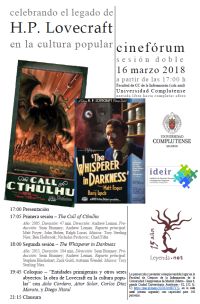

Para conmemorar el aniversario de H.P. Lovecraft, este 16 de Marzo (viernes) tendrá lugar en la Universidad Complutense una jornada de homenaje a su obra, bajo el título Celebrando el legado de H.P. Lovecraft en la cultura popular.
Este evento ha sido organizado por Brián (gran usuario de esta web y mejor persona), dentro de las actividades del 15º aniversario de Leyenda.net
Primero se proyectarán dos películas de la HPLHS (H.P. Lovecraft Historical Society), estupendas adaptaciones de sendos relatos de Lovecraft: The Call of Cthulhu (2005) y The Whisperer in Darkness (2011).
Y después tendremos una charla-coloquio tentacular, con la intervención, entre otras eminencias, de nuestro bienamado webmaster Aitor Solar (Entropía).
Las actividades (por supuesto gratuitas) se celebrarán de 17 a 21h en la Sala Azul de la Facultad de Ciencias de la Información (enfrente del metro Ciudad Universitaria). Podéis consultar aquí el programa completo.
¡Os esperamos!
| Pág. 3/13 |
--- Eso puede ser cierto perfectamente porque, técnicamente, yo no estoy en el país, así que no cuento...![]()
Ah, maníacos homicidas y humildad, los sellos característicos de este foro que tanto adoro... ![]()
Ah, maníacos homicidas y humildad, los sellos característicos de este foro que tanto adoro... ![]()
--- (Me están llamando maníaco homicida... este no lo va a contar... ![]() )
)
Cine y Lovecraft. Que si a Lovecraft no le gustaba mucho el cine y por eso puede ser que sus escritos sean tan poco cinematográficos y se adapten tan malamente al lenguaje visual... Que fue a ver nosequé película y tal y cual... Que el cine no sabe adaptar a Lovecraft. Que si se adapta mejor al corto que al largo... Un repaso de la filmografía Lovecraft Ivana con especial interés en reanimator, el palacio de los espíritus, John Carpenter y la más modernas que se proyectan ese día... Y luego un repaso al mundo cortometraje y el circuito de festivales norteamericano y los pocos y casi siempre tristes intentos del cine español de hacer pelis de los mitos. Y Guillermo del Toro.
Todo lo que hemos hablado ya por aquí.
Pues por lo que he leído a Lovecraft sí le gustaba algo el cine, y algunas películas bastante.
Como dijo Joshi en LOVECRAFT AND A WORLD IN TRANSITION
Collected Essays on H. P. Lovecraft
-Lovecraft and the Films of His Day
H P. Lovecraft’s opinion of film was not high. This fact should not be surprising: to one so devoted to the written word, the crude films of Lovecraft’s early years could only engender a shudder of disgust. Moreover, his first love in the performing arts was drama, and on the whole he preferred the stage to the cinema. He wrote in 1934:
I first saw a play at the age of 6. Later, when the cinema appeared as a separate institution (it had been part of the Keith vaudeville since 1898 or 1899), I attended it often with other fellows, but never took it seriously. By the time of the first cinema shows (March 1906, in Providence) I knew too much of literature and drama not to recognise the utter and unrelieved hokum of the moving picture. (SL 4.355)
Lovecraft was, however, a little disingenuous here, because his early letters actually testify to a considerable enjoyment of the films of the 1910s and 1920s—not merely horror or fantasy films, which he might be expected to enjoy, but comedies and melodramas as well. In 1915 he actually wrote a poem to Charlie Chaplin (“To Charlie of the Comics”), and in a later letter compares the merits of Chaplin and Douglas Fairbanks (SL 1.50–51). At this time he declared himself “a devotee of the motion picture,” remarking that “Some modern films are really worth seeing, though when I first knew moving pictures their only value was to destroy time” (SL 1.18).
In 1917 occurred a peculiar episode. Lovecraft went to see a film, The Image-Maker of Thebes,[13] at Fay’s Theatre in Providence. The theatre was offering a prize of $25 for the best review of the film, and Lovecraft decided to participate. He found the film very poor: “. . . a rough-hewn amateurish affair dealing with reincarnation in a pitifully feeble and hackneyed manner, containing not the slightest subtlety or technical skill in plot, directing, or setting” (SL 1.42–43). His review was very harsh, and yet it won the prize! Regrettably, the review was never published, and now appears to be lost.[14] It perhaps constitutes the only instance of film criticism by Lovecraft!
By 1919 Lovecraft was professing that “I formerly attended the cinema quite frequently, but it is beginning to bore me” (SL 1.89). Nevertheless, he saw D. W. Griffith’s The Birth of a Nation (1915) both as a stage play[15] and as a film (SL 1.89), and also read the book on which they were based, Thomas Dixon’s The Clansman (1905). It must be admitted that Lovecraft’s enjoyment of this film about the Ku Klux Klan in the years following the Civil War may well have stemmed from his agreement with the film’s racialist bias.
The Image-Maker of Thebes may not have been the first “weird” or supernatural film Lovecraft saw; he earlier notes seeing the film version (1915) of George du Maurier’s novel Trilby, Trilby, although he remarks that “it seemed incomplete to me because I have seen the actual play, and have attached so much importance to the deep, fiendishly insinuating voice of Svengali” (SL 1.18). A later letter is very harsh concerning some of the great horror films of the day:
As a thorough soporific I recommend the average popularly “horrible” play or cinema or radio dialogue. They are all the same—flat, hackneyed, synthetic, essentially atmosphereless jumbles of conventional shrieks and mutterings and superficial, mechanical situations. The Bat made me drowse back in the early 1920’s—and last year an alleged Frankenstein on the screen would have made me drowse had not a posthumous sympathy for poor Mrs. Shelley made me see red instead. Ugh! And the screen Dracula in 1931—I saw the beginning of that in Miami, Fla.—but couldn’t bear to watch it drag to its full term of dreariness, hence walked out into the fragrant tropic moonlight! (SL 4.154–55)
To those who have come to regard these films as “classics” in their own right, it must be remembered that the film medium was still new and unrecognised in Lovecraft’s day, and that it had scarcely begun to show the subtlety and profundity of later works; as an aesthetic medium it was decidedly inferior to literature, and Lovecraft’s response is by no means unusual or unexpected. It is from this perspective that we must interpret his comparison of the film version of Gustav Meyrink’s The Golem with the original novel. Of the book he stated that it was “the most magnificent weird thing I’ve come across in aeons! The cinema of identical title in 1921 was a mere substitute using the name—with nothing of the novel in it” (SL 5.138). And yet, Lovecraft did find praise for the film version of The Invisible Man (1933): “Surprisingly good—might easily have been absurd, yet succeeded in being genuinely sinister” (SL 4.362). In an unpublished letter to August Derleth, Lovecraft says that he wanted to see the bizarre Cabinet of Dr. Caligari (1921), but never did so.[16] And let us not forget his enthusiasm at seeing The Phantom of the Opera (1925) in New York:
. . . what a spectacle it was!! It was about a presence haunting the great Paris opera house . . . but was developed so slowly that I actually fell asleep several times during the first part. Then the second part began—horror lifted its grisly visage—& I could not have been made drowsy by all the opiates under heaven! Ugh!!! The face that was revealed when the mask was pulled off . . . & the nameless legion of things that cloudily appeared beside & behind the owner of that face when the mob chased him into the river at last![17]
His diary reports a viewing of The Lost World (an adaptation of the Conan Doyle novel) on 6 October 1925, but there is no corresponding letter testifying to his reaction to this remarkable film, a landmark in the use of special effects in its depiction of dinosaurs in South America. One would like to think he would have appreciated the nightmarish futuristic visions of Fritz Lang’s Metropolis, since they coincide so starkly with Lovecraft’s own foreboding prophecies of a future controlled by soulless machines.
Perhaps Lovecraft did not approach films in the proper light, especially films that adapted existing literary works. He seems to have believed that the sole criterion of excellence in such works was the faithfulness of their adaptation of the original text. But a “film adaptation” is very much an adaptation—a transference of moods, images, and effects from one medium to another. Many have asserted that Lovecraft’s own tales are “unadaptable” to film or any other medium; and in a sense that is true, if one assumes that such an adaptation will mechanically duplicate the effect of the written word on to the screen. Such an undertaking is futile from the start.
An entirely different type of film that Lovecraft found very stimulating was the historical film, especially those set in his beloved eighteenth century. In 1921 he noted that he had seen both the stage and the cinema version of David Garrick, based on a play by T. W. Robertson.[18] Of the cinema version Lovecraft remarks: “This was one of the finest scenic productions I ever saw—the eighteenth century and Dr. Johnson’s day mirrored without flaw or anachronism. In matters of scenery the moving picture can of course leave the stage far behind; though this hardly atones for the lack of sound and colour” (SL 1.127). Late in life Lovecraft saw several films of this kind. Interestingly, he enjoyed Cecil B. DeMille’s Cleopatra (1934), stating that it “had excellent Roman scenes” (SL 5.100); evidently the daringly scanty attire worn by Claudette Colbert did not offend his usually prudish sensibilities.
But the historical film that Lovecraft enjoyed above all others was Berkeley Square (1933), based on a play by John Balderston. This film is a sort of historical fantasy in which a man of the twentieth century somehow merges his personality with that of his eighteenth-century ancestor. Lovecraft saw the film four times in late 1933 and praised it highly, largely because it echoed some of his deepest sentiments:
It is the most weirdly perfect embodiment of my own moods and pseudo-memories that I have ever seen—for all my life I have felt as if I might wake up out of this dream of an idiotic Victorian age and insane jazz age into the reality of 1760 or 1770 or 1780 . . . the age of the white steeples and fanlighted doorways of the ancient hill, and of the long-s’d books of the old dark attic trunk-room at 454 Angell St. God Save the King! (SL 4.364)
In a recent article[19] Darrell Schweitzer argues for the possible influence of this film on Lovecraft’s own time-travel story, “The Shadow out of Time” (1934–35).
But a much earlier influence of film upon Lovecraft’s stories can be cited. In the prose-poem “Nyarlathotep” (1920) the mysterious Egyptian figure of the title presents strange pictures “shadowed on a screen.” In a letter describing the dream that inspired the story, Lovecraft remarks that among the exhibitions in Nyarlathotep’s presentation was “a horrible—possibly prophetic—cinema reel” (SL 1.161). This is certainly the earliest use of explicit film imagery in Lovecraft; and his later stories show many signs of such imagery. The whole issue of Lovecraft and movies has yet to be explored in detail; but in spite of his generally low opinion of the films of his day, it can be argued that film played no insignificant role in his life. May we not, then, expect that someday film makers will repay the favour by producing an adaptation of Lovecraft’s work that is worthy of the name?
Lo que estoy empezando a ver es que no sé qué contar en la charla. Me parece que la van a enfocar mucho en el cine, y no de eso no tengo ni papa. Es una pena que no venga Gorgo porque le diría que subiese en mi lugar ![]() .
.
Saludos,
Entro
Coincidiendo con Neddam (en lo de tu solvencia, no en lo de los maniacos homicidas) lo único que puedo añadir es que entre los ponentes hay dos que tiran hacia el cine, y dos que tiran hacia otras manifestaciones "pop-lovecraftianas". Y de cada uno "se espera" (en realidad no se espera nada, salvo pasar un buen rato) que hable de lo que más le apetezca (y crea que pueda saber más, que suele ser de lo que más le apetece hablar a uno). Todo en un plan distendido y con cervezas si hace falta.
¡Eso es, entrenadme! ![]()

Saludos,
Entro
Ya tenéis media charla de erudito casposo.
Son diez reales.![]()
Sírvete:

Saludos,
Entro
![]()
| Pág. 3/13 |

| Pág. 3/13 |
